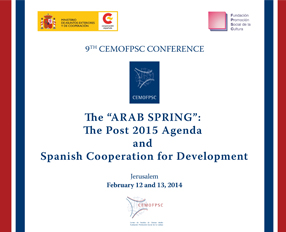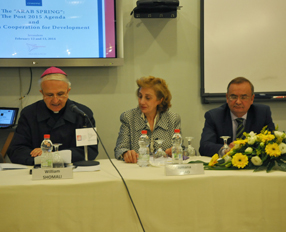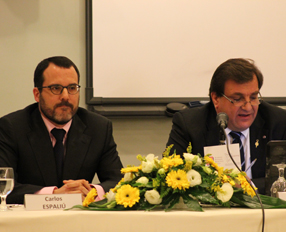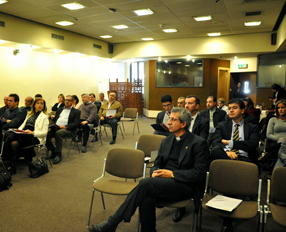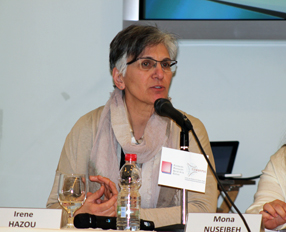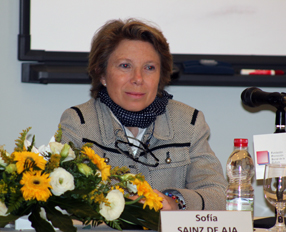During the 12th and 13th of February, The IX series of lectures organized by the Center for Middle Eastern Studies FPSC CEMOFPSC entitled “The Arab Spring: The post-2015 Agenda and the Spanish Cooperation for Development” took place in Jerusalem in the Pontifical Institute Notre Dame of Jerusalem Center.
During the seminar an exercise of reflection and dialogue was conducted by the meeting of experts on the opportunities and the threats posed by the Arab Spring for the Development Cooperation in the Middle East, on the convergences and divergences between the two and the Post 2015 Agenda.
The Seminar also addressed the issues of democratic governance in Arab countries in line with the Sustainable Development Objectives of Post 2015 Agenda and the possible tools that the Spanish Cooperation should promote towards a peace resolution to the conflict between Israel and the Palestinian Territories.
Jumana Trad, President of Foundation for Social Promotion of Culture (FPSC), the Auxiliary Bishop of Jerusalem, Bs. William Shomali and Juan José Escobar, General Consul of Spain in Jerusalem took part in the first session: Opening Conference.
Bishop Shomali welcomed everyone to Jerusalem and in his speech warned of the problem of the exodus of Christians from the Middle East, due to the hostility of the region, he specifically referred to the case of Syria and Egypt and advocated the necessary inclusion of issues such as Democracy and Human Rights in Education.
The General Consul of Spain in Jerusalem in turn emphasized the effort that Spain has made investing a very important amount of help in the Palestinian Territories since 2008.
The second round table entitled ” Israel and Palestine, Spanish Cooperation and Peace Building “ began and was focused on Israel, Palestine and the promotion of a peace resolution in this part of Middle East. They took part: Bassem Khoury, former Minister of National Economy (Palestine), Nadia Hilou, former member of the Knesset for the Labor Party (Israel), Saman Khoury, General Director of the Peace and Democracy Forum (Palestine) and Gershon Baskin Founder and Co-Chairman of the board of the Israeli/Palestine Center for Research and Information (IPCRI) (Israel).
The third panel addressed the issue of democratic governance in the Arab society, in line with the Sustainable Development Objectives post-2015 agenda and the tools, resources and guidance of official development assistance. The speakers were, Carole Rigaud (EU), Fateh Azzam, Director of Asfari Institute for Civil Society and Citizenship and former Representative for Middle East at Office of the UN High Comissioner for Human Rights (American University of Beirut / Lebanon) and Abla Amawi, Governance Team Leader/ Senior Adviser at UNDP/ Programme of Assistance to the Palestinian people.
On the second day a round table was held and “success stories” or examples of good democratic governance in the Middle East were presented.
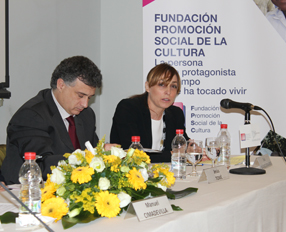
According to Eva Suarez, the Masar program increases the capacity of civil society to participate in the democratic process. For Jesus Tomé, the objective of the program is to strengthen public institutions, civil society and promote human rights. Also he noticed that one of the issues taken up in the program is the way in which the security and order forces address the issue of violence against women.
The next speaker, Mona Nuseibeh, Programme Support Consultant for UN Women Jerusalem, also referred the latter question. The fields where they are mostly developing their work are violence against women, politics, where they are promoting the effective participation of women in decision-making bodies of their peoples, at local level and the economy.
She highlighted the impulse received from Spain since the beginning of its activity in 1997 to defend the position of women in society.
Annie Medzaghopian, Executive Director of Al Hussein Society (Jordan) warned that the main component of democracy is to ensure access to services. She commented on the campaign of attention to the group of Syrian refugees with disabilities being developed by the FPSC in the field of Za’atri.
Her way of working to promote accessibility and a more inclusive Jordanian society is to involve all society, NGOs, governments etc. and she believes that this model is replicable in the region.
Irene Hizou, Academic Vice President at the Bethlehem University said that her university has to play a leading and active role in the future nation of Palestine. She thinks that education pivots that nation building, it is the core of a country and it should promote respect for human values.
The seminar concluded with a general discussion to gather the findings and recommendations made during the reflection and dialogue conducted over two days.
The closing of the Seminar was given by the General Secretary of the FPSC, Monica Bohigues.





